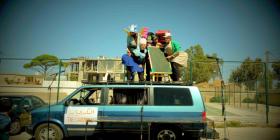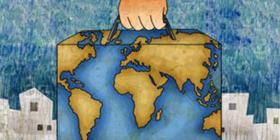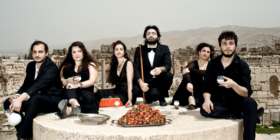Minorities in the spotlight thanks to street theatre

Bedouins from Gaza, the Tunisian black community and Syrian refugees living in Lebanon. At first glance, these three minorities hailing from the Middle East and North Africa regions barely have much in common. But what connects them all is the fact that they will all represent the topics of stage plays for the coming year. Indeed, after a successful round of seven projects, the Drama, Diversity and Development (DDD) project, one of the three grant projects co-funded by the European Union within the framework of the Med Culture regional programme, has just launched new projects in Lebanon, Palestine and Tunisia in order to shine a spotlight on these communities.
Active in seven countries in the Southern Mediterranean Sea area, the DDD project aims to fight racism and discrimination against minorities through arts and street theater. In order to achieve this goal, the project promotes cultural diversity through stage plays accessible to the general public. It helps civil society organisations and cultural associations put together a play and put it on show in a fast-changing environment.
Nessim Ghroum, the regional coordinator of the project, explains: “We're not aiming to promote a specific cultural piece of work; we are more interested in the process of accompanying those projects that plan to use culture as a tool to help human rights move forward.” In this area, the public budget allocated to cultural projects is very limited.
However, in many places, discussions about the existence of minorities and their positive integration have just begun to get under way as part of the political transition processes. This means that arts organisations are interested in minorities. The projects selected under DDD are co-funded by the European Union within the framework of the Med Culture programme, along with the co-funding from the Prince Claus Fund For Culture and Development.
DDD has released an open call for applications in order to select the projects. Minorities must be victims of discrimination in order to gain the programme’s support. For this new session, and after selecting several short-listed candidates and meeting the people behind the various proposals, the project has decided to highlight the Tunisian black community, the Bedouins of Gaza and Syrian refugees in Lebanon.
As in the previous round of projects, all performances will use different artistic approaches, but will incorporate a common technique: street theatre. But as a matter of fact, these works are not often shown on the streets: “Public space is difficult to access in the whole area. Authorities are often suspicious when it comes to freedom of speech. Indeed, despite the Arab Spring, some of these countries are still under the thumb of authoritarian regimes,” says Ghroum. Most of the time, DDD's supported plays are shown in community centres. And in order to reach a maximum number of viewers, entry is free of charge and open to the public. As the minority theme may be a sensitive one in some countries, it is not always easy to make the performances happen. For instance, the play “B7al B7al” has been forbidden by local authorities in several cities in Morocco last year.
After the projects have been established, the other goal of the DDD programme is to enable them to travel. Indeed, several artists have already met one another, and Ghroum is proud to announce that some companies and organisations from the first session have already been planning on working together on new ideas.
For more information on the Drama, Diversity and Development project, please click here (website) and here (Facebook page).
For more information on each of the Drama, Diversity and Development 2016 projects, please click on the following:
- Young Stories of Bedouin Life and Prejudice (Palestine)
- The Caravan (Lebanon)
- Black Is a Value (Tunisia)
- K’Art-Na (Tunisia)
Content produced in collaboration with Cineuropa







